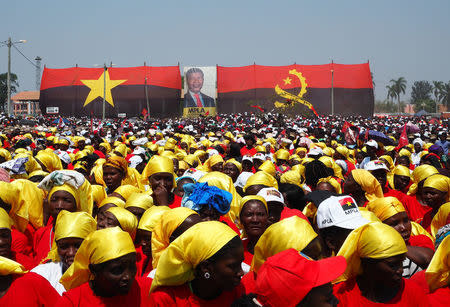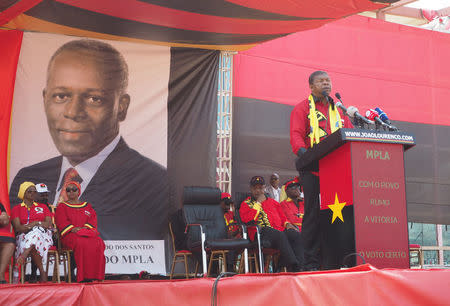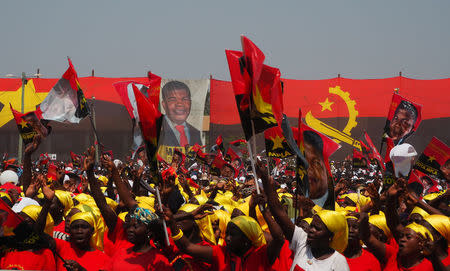Lourenço, the quiet man leading Angola’s 38-year changing of guard
By Stephen Eisenhammer MALANJE, Angola (Reuters) - On a hot morning in August, João Lourenço, a man more used to army barracks and the closed doors of party politics, rose awkwardly to address thousands of rural supporters. For most in the crowd, trucked in from surrounding villages and kitted out in red T-shirts, the stern-faced man before them was an unknown quantity, a quiet man who used to be defence minister. But they will almost certainly be calling him their president after next Wednesday's election -- the first new head of state in oil-producer Angola in 38 years, going back to when Jimmy Carter ran the United States and Leonid Brezhnev the Soviet Union. In common with many of Angola's Soviet-trained leaders, Lourenço's rhetoric to the crowds was conservative, even in the face of economic crisis. "There is much that still needs to be done," he told the rally as a loud speaker encouraged applause. "We will put you to work," he said, vowing to grow agricultural production in this poor farming community. Indeed, beyond common campaign promises to combat corruption, diversify the economy and attract more investment, few know what to expect from the 63-year-old when he is in office. There are some who question how much freedom he will have. His predecessor, José Eduardo dos Santos, who accumulated huge power and his family great wealth, ruled Angola from 1979, four years after independence from Portugal, and will continue to exert influence as leader of the MPLA party. But those who know Lourenço say he may be quiet, but he is no puppet. "He's a man of conviction," said João Melo, a party lawmaker from 1992 to 2017 who worked with Lourenço on several parliamentary commissions. "He represents change and change is absolutely vital for the long-term survival of the MPLA." ECONOMIC CRISIS Corruption and a deep economic crisis have put pressure on the People's Movement for the Liberation of Angola (MPLA), a party that has led comfortably since the end of civil war in 2002. After years of rapid growth, the economy of Africa’s second largest crude producer contracted 3.6 percent last year. Unemployment is officially over 20 percent, while a shortage of foreign currency due to suppressed oil prices has forced companies to pull back operations. Corruption is rampant, inequality brutal. Transparency International ranks Angola as the 164th most corrupt country out of 176. There are hopes among reformers that Lourenço can bring change, But he is undoubtedly of the old-guard. He joined the MPLA as a combatant in his early 20s as the country gained independence from Portugal. He went on to study military strategy and history in the Soviet Union in the late '70s, before returning to serve as political commissar during the civil war. "Disciplined" is a word often used to describe him -- and he rarely smiles. That leaves those guessing at his economic policy to point to his wife, Ana Dias Lourenço, a former planning minister who worked until recently at the World Bank. Running for a parliamentary seat, she is expected to be influential. CORRUPTION Lourenço has also been outspoken about corruption, criticising the paying of bribes -- so entrenched in Angolan society it is referred to as a “gasosa” or soft drink, from the days when you would pay off police with a can of cola. With this in mind, in June, he told a rally it was time to “put salt in the soft drink”. As governor of Benguela province from 1987 to 1990, he cracked down on corruption, even jailing members of his own party. But questions remain as to whether he will have the clout to go after senior figures. His hands already seem tied. A recent law grants dos Santos immunity, while a separate piece of legislation protects the jobs of senior military and intelligence officials. Dos Santos’ family hold top jobs with his daughter, Isabel, heading national oil producer Sonangol, and his son José Filomeno, in charge of the state investment fund. For Alves da Rocha, one of Angola’s leading economists, much depends on the size of majority Lourenço gets on Wednesday. “If the MPLA gets 55 percent or less, it doesn’t give Lourenço enough political leeway. It’s effectively a defeat,” he said. With little credible polling, the result remains unpredictable. One of the few legitimate surveys gave the MPLA 61 percent. Party insiders say they would be happy with a score above 60. Either way, if Lourenço is unable to combat corruption and get the economy on track, the MPLA could face future defeat under his leadership. “It’s a question of survival,” said Paulo Faria, a politics professor at the state Agostinho Neto university in Luanda. “He has to drive reform.” (Editing by Joe Brock)

 Yahoo News
Yahoo News 


